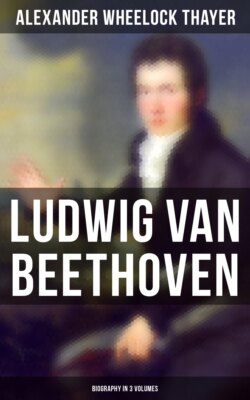Читать книгу Ludwig van Beethoven (Biography in 3 Volumes) - Alexander Wheelock Thayer - Страница 34
На сайте Литреса книга снята с продажи.
Chapter XVI
ОглавлениеTable of Contents
Beethoven’s Social Life in Vienna—His Friends: Vogl, Kiesewetter, Zmeskall, Amenda, Count Lichnowsky, Eppinger, Krumpholz—Schuppanzigh and His Quartet—Hummel—Friendships with Women—His Dedications.
The chronological progress of the narrative must again be interrupted for a chapter or two, since no picture of a man’s life can be complete without the lights or shades arising from his social relations—without some degree of knowledge respecting those with whom he is on terms of equality and intimacy and whose company he most affects. The attempt to draw such a picture in the case of Beethoven, that is, during his first years in Vienna, leaves much to be desired, for, although the search for materials has not been very unsuccessful, many of the data are but vague and scattered notices. In a Conversation Book, bearing Beethoven’s own date “on the 20th of March, 1820,” some person unknown writes:
Do you want to know where I first had the honor and good fortune to see you? More than 25 years ago I lived with Frank of Prague in the Drachengassel in the old Fish Market. Several noblemen, for instance His Excellency van B. Cristen (?), Heinerle, Vogl (now a singer), Kösswetter, basso, now Court Councillor, Greyenstein (?), has long been living in France, etc. There we often
musicicised, etc.
supperized, etc.
punchized, etc.
and at the conclusion Your Excellency often rejoiced us at my P. F. I was then Court Councillor in the War Office (?). I have practised since then at least 15 thousand métiers—Did we meet in Prague? In what year?—1796—3 days—I was in Prague also in 1790–1-2.
There is nothing in the portions of this Conversation Book, copied for this work, to show who this man of “15 thousand métiers” was, now sitting with Beethoven in an eating-house, and recalling to his memory the frolics of his first year and a quarter in Vienna; nor are Heinerle, Cristen, Greyenstein and Frank of Prague sufficiently known to fame as to be now identified; but Johann Michael Vogl, less than two years older than Beethoven, was afterward a very celebrated tenor of the opera. In 1793–4 he was still pursuing the study of jurisprudence, which he abandoned in 1795 for the stage. May not this early friendship for Beethoven have been among the causes of the resuscitation of “Fidelio” in 1814, for the benefit performance of Vogl, Saal and Weinmüller?
There is a story, first put in circulation by a certain August Barth, to the effect that the singer of that name once finding Beethoven employed in burning a mass of musical and other papers, sang one vocal piece thus destined to destruction, was pleased with it, and saved the immortal “Adelaide!” The story is sufficiently refuted by the fact that when Barth first came to Vienna, in 1807, the “Adelaide” had been in print some ten years. If the name Vogl be substituted in the tale, there may, perhaps, be so much truth in it as this: that he was consulted upon the merits of the composition by Beethoven, approved it, and first sang it and made it known—as he was the first, years afterwards, to sing in public the “Erlkönig” and other fine productions of Franz Schubert. The “Kösswetter, basso,” was Raphael George Kiesewetter, who lived to be renowned as a writer upon topics of musical history, and to play a part in the revival of ancient music in Vienna, not less noteworthy than that of Thibaut in Heidelberg. At the period of the “music-making, supping and punch drinking” by the “noblemen” in the apartments of Frank of Prague, Kiesewetter was a young man of twenty, engaged, like Vogl, in the study of the law. In the spring of 1794—and thus the date of these meetings is determined—he received an appointment in the military chancellary, and went at once to the headquarters at Schwetzingen on the Rhine. More important and valuable during these years, as subsequently, was the warm, sincere friendship of Nicolaus Zmeskall von Domanovecz, an official in the Royal Hungarian Court Chancellary. “You belong to my earliest friends in Vienna,” writes Beethoven in 1816. Zmeskall, to quote the words of Sonnleithner,
